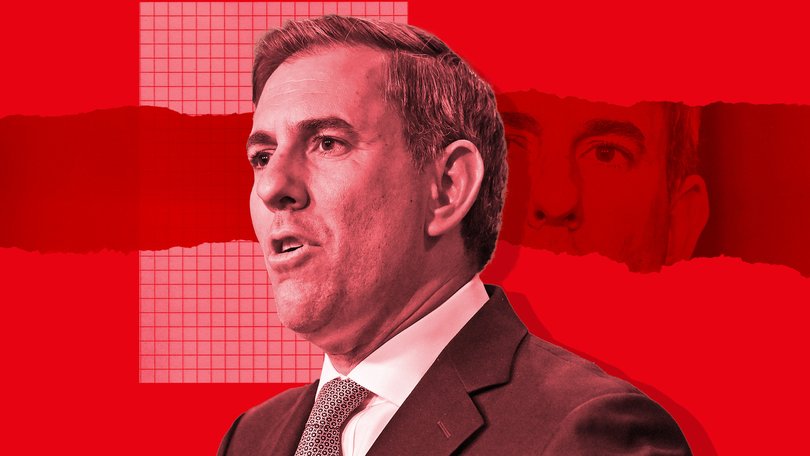AARON PATRICK: If Jim Chalmers was a fund manager, he would be fired
AARON PATRICK: The Treasurer is urging professional investors to put their money in Australia. His policies are driving capital away.

Jim Chalmers on Friday morning told the cream of Australia’s institutional investors — the men and women managing $4 trillion in retirement savings — to bet on their country.
“I think Australia is the best investment opportunity in the world,” he told the Sohn investment conference at Sydney Opera House.
An independent stock analyst would rate Australia a “sell” under Dr Chalmers’ government.
Sign up to The Nightly's newsletters.
Get the first look at the digital newspaper, curated daily stories and breaking headlines delivered to your inbox.
By continuing you agree to our Terms and Privacy Policy.If the Treasurer had not spent hundreds of billions buying off constituencies, the government would have been able to afford more than token tax cuts for the workers who generate most of the wealth.
Lower taxes would have created an incentive for Australians to work harder. Instead, Dr Chalmers’ government re-regulated the workplace.
Workplace bureaucracy crimps the natural Australian work ethic. Australian workers are less efficient, in descending order, than counterparts in Ireland, Norway, Belgium, Switzerland, Denmark, America, Austria, Iceland, the Netherlands, Germany, Sweden, France, and Finland, according to the Organisation for Economic Co-operation and Development, a think tank in Paris.
One example: salaried Woolworths managers are covered by penalty, allowance and overtime rules designed for sales assistants and stock fillers, according to a decision last month by the Fair Work Commission.
A fourth economy?
Dr Chalmers’ big spending budgets over-stimulated the economy. Without them, according to leading economist Chris Richardson, interest rates could have fallen faster and further. Cheaper money would have fuelled investment, allowing entrepreneurs to create businesses of the future.
Instead, Dr Chalmers is overseeing subsidies in wind and solar energy he pretends are as significant as the introduction of the internal combustion engine, computers, share and bond markets or the internet.
“Now it’s time to build a fourth economy,” he told the investors today. “Our alpha is at the intersection of energy and technology, against the backdrop of geography, demography and geopolitics.”
Alpha is investment jargon for an investor’s performance.
One day, well into the future, the huge government-directed investments could pay for themselves. No-one really knows if they will though, and those investors at the Opera House will not put their clients’ money into renewable energy schemes without government guarantees or subsidies.
Rising power prices
Rather than overseeing a new industrial revolution, the government is directing capital away from two industries where Australia is a global leader: coal and natural gas.
The cross-subsidies used to build up this new, uneconomic industry are driving up power prices, making Australians poorer. Of all members of the Group of 20 leading economies, Australia has the fifth-most expensive electricity, behind Germany, Italy, Britain and France, according to a survey this year by a German company, Verivox.
Australia’s wealth is built on a small range of mostly simple products, according to Harvard University’s index of economic complexity.
The ranking measures the sophistication of what each country makes and sells. It is based on the assumption that a country will become richer over time if it can develop from mining coal to making steel to producing cars.
Since the dawn of the e-commerce revolution in 2000, Australia has fallen from 71st to 105th on the index, putting it behind Zambia, Panama and Senegal.
One of Australia’s neighbours, Singapore, hit the top position this year. With limited natural resources, Singapore has become rich selling business services, refining oil and manufacturing computer chips.
Australia depends on agriculture, iron ore and energy. Predictions Australia will become a “green superpower” seem unlikely when projects like the Snowy Mountains hydro-electric battery have blown out to $12 billion from $2 billion.
“Australia is the best opportunity you’ll hear about today,” Dr Chalmers said.
If that were true, the results might be seen in the share market. Share prices are a predictor of future profits, which reflect a nation’s prosperity.
Since the Labor government was elected, the S&P/ASX 200 index has risen 21 per cent. Over the same period, Wall Street’s Dow Jones Industrial Average has risen 47 per cent, the British FTSE 100 is up 32 per cent and Japan’s Nikkei 225 is up 91 per cent.
The MSCI World index, which measures all significant stocks, has risen 64 per cent since Dr Chalmers became Treasurer. Which means the Treasurer’s alpha over the past three-and-a-half years is negative 43 per cent.
If he was a fund manager, Dr Chalmers would be sacked, which suggests he should not provide financial advice to professionals.

